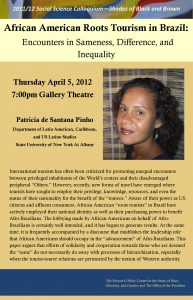International tourism has often been criticized for promoting unequal encounters
between privileged inhabitants of the World’s centers and their disadvantaged
peripheral “Others.” However, recently, new forms of travel have emerged where
tourists have sought to employ their privilege, knowledge, resources, and even the
status of their nationality for the benefit of the “tourees.” Aware of their power as US
citizens and affluent consumers, African American “roots tourists” in Brazil have
actively employed their national identity as well as their purchasing power to benefit
Afro-Brazilians. The lobbying made by African Americans on behalf of Afro-
Brazilians is certainly well intended, and it has begun to generate results. At the same
time, it is frequently accompanied by a discourse that establishes the leadership role
that African Americans should occupy in the “advancement” of Afro-Brazilians. This
paper argues that efforts of solidarity and cooperation towards those who are deemed
the “same” do not necessarily do away with processes of hierarchization, especially
when the tourist-touree relations are permeated by the notion of Western authority.
